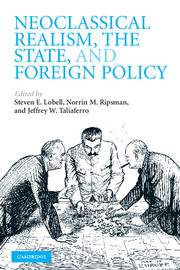Book contents
- Frontmatter
- Contents
- List of figures
- List of tables
- List of contributors
- Acknowledgments
- 1 Introduction: Neoclassical realism, the state, and foreign policy
- 2 Threat assessment, the state, and foreign policy: a neoclassical realist model
- 3 Neoclassical realism and strategic calculations: explaining divergent British, French, and Soviet strategies toward Germany between the world wars (1919–1939)
- 4 Neoclassical realism and identity: peril despite profit across the Taiwan Strait
- 5 Neoclassical realism and the national interest: presidents, domestic politics, and major military interventions
- 6 Neoclassical realism and domestic interest groups
- 7 Neoclassical realism and resource extraction: State building for future war
- 8 Neoclassical realism and state mobilization: expansionist ideology in the age of mass politics
- 9 The limits of neoclassical realism: additive and interactive approaches to explaining foreign policy preferences
- 10 Conclusion: The state of neoclassical realism
- Index
- References
1 - Introduction: Neoclassical realism, the state, and foreign policy
Published online by Cambridge University Press: 05 June 2012
- Frontmatter
- Contents
- List of figures
- List of tables
- List of contributors
- Acknowledgments
- 1 Introduction: Neoclassical realism, the state, and foreign policy
- 2 Threat assessment, the state, and foreign policy: a neoclassical realist model
- 3 Neoclassical realism and strategic calculations: explaining divergent British, French, and Soviet strategies toward Germany between the world wars (1919–1939)
- 4 Neoclassical realism and identity: peril despite profit across the Taiwan Strait
- 5 Neoclassical realism and the national interest: presidents, domestic politics, and major military interventions
- 6 Neoclassical realism and domestic interest groups
- 7 Neoclassical realism and resource extraction: State building for future war
- 8 Neoclassical realism and state mobilization: expansionist ideology in the age of mass politics
- 9 The limits of neoclassical realism: additive and interactive approaches to explaining foreign policy preferences
- 10 Conclusion: The state of neoclassical realism
- Index
- References
Summary
How do states, or more specifically the decision-makers and institutions that act on their behalf, assess international threats and opportunities? What happens when there is disagreement about the nature of foreign threats? Who ultimately decides the range of acceptable and unacceptable foreign policy alternatives? To what extent, and under what conditions, can domestic actors bargain with state leaders and influence foreign or security policies? How and under what circumstances will domestic factors impede states from pursuing the types of strategies predicted by balance of power theory and balance of threat theory? Finally, how do states go about extracting and mobilizing resources necessary to implement foreign and security policies? These are important questions that cannot be answered by the dominant neorealist or liberal theories of international politics.
Consider the following: in 1945, and again in 1990, the United States emerged victorious from a major war or an enduring rivalry. In each postwar period, officials in Washington faced the daunting task of assessing and responding to new and unfamiliar international threats. However, the resulting shifts in grand strategy were not predictable solely based upon an analysis of relative power distributions or the dynamics of American domestic politics at the time.
The bipolar distribution of power following the Second World War does not explain why the United States embarked upon a grand strategy of containment, which eventually mixed both realpolitik and liberal internationalist ends and means, over the alternative of competitive cooperation with the Soviet Union through a sphere-of-influence arrangement in Europe.
- Type
- Chapter
- Information
- Neoclassical Realism, the State, and Foreign Policy , pp. 1 - 41Publisher: Cambridge University PressPrint publication year: 2009
References
- 91
- Cited by

